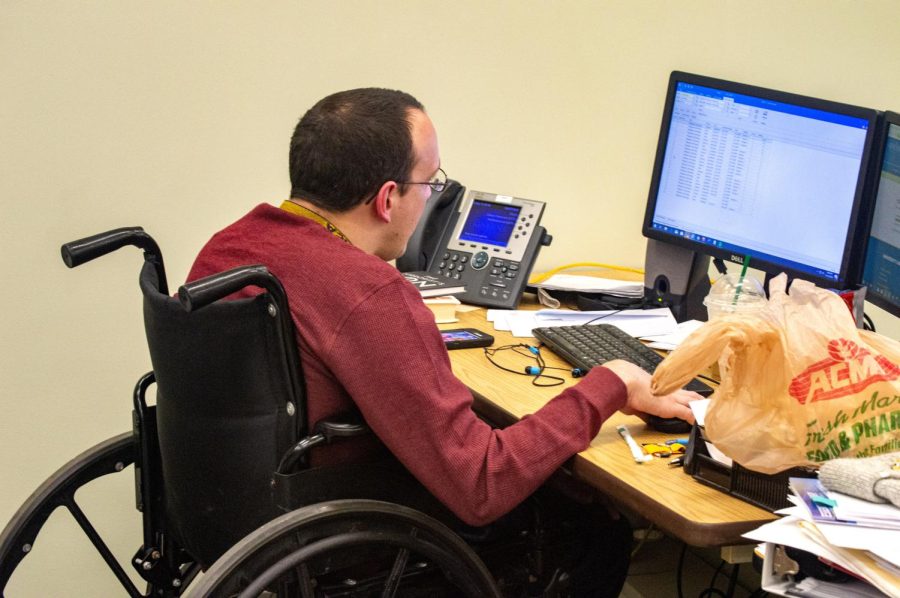Becoming an ally of the disabled takes information, understanding
Tony Snyder has cerebral palsy and works in the Kent State University library as a Copyright and Interlibrary Loan Associate. He works on processing interlibrary loan requests that will eventually result in items from the libraries being sent across the country and worldwide. Snyder says, “Interlibrary loan is like having the world’s libraries at your fingertips.”
November 19, 2019
Dealing with misconceptions about his physical condition doesn’t stop Tony Snyder, a Kent State copyright and library loan associate, from excelling in life and his career.
Snyder has cerebral palsy, a disorder that affects body movement and muscle coordination.
As a child, a lot of people asked him, “What’s wrong?” as if his disability was something that could be fixed, he said.
The worst example he shared was when he was a sophomore in high school.
“I was sitting in health class, and my teacher came up to my aide and said, ‘Can he read?,’ with a very low voice,” Snyder said. “It was rather jarring, because he was so unaware.”
Establishing relationships or knowing someone with a disability are ways typical people can become more informed and be allies to those who have a disability.
It is also important to treat them how they want to be treated and be aware of their surroundings.
There are a lot of common misconceptions about disabilities, but one of the most recurring ones is that a disability is visible or always the same for every person, said Amanda Feaster, director of student accessibility services.
“Each individual will experience their disability differently, which is why it’s important to hear each person’s story rather than assuming what their disability is based on what we see on TV or on social media,” Feaster said. “Disability isn’t about what’s “wrong” with a person; it’s about a space or social setting having barriers for some people.”
Barriers can be physical, such as a building with no ramp, or a typical person assuming people with disabilities aren’t able to help themselves, she said.
“If we can recognize and remove these barriers, we can create equitable experiences where people with disabilities can participate fully and independently,” Feaster said.
One way to help someone with a disability is to ask if there is something that’s helpful to them, rather than assuming or trying to guess, she said. Active listening is also key, and it’s one of the most important things someone can do to be an ally for Snyder.
“When I’m getting into a car, which I can usually do on my own if it sits low enough, and I say, ‘I don’t need any help,’ it’s true,” Snyder said. “But if I ask you to help me, you can, instead of thinking you already know what I need and being in my way.”
If someone is afraid to help because they are worried about what a person with disabilities will say, Snyder thinks it’s important to establish a relationship first by asking questions instead of assuming.
People should also be aware of their surroundings and mindful about the space they use.
“My biggest concern at the moment is the sidewalks of Kent itself, so when I’m headed to campus,” Snyder said. “I see a lot of the Flashfeet bikes in the middle of the sidewalk as I go to work, and I can usually get around them, but it is a nuisance.”
As winter approaches, it is especially significant that people are vocal about anything they see that’s hindering accessibility on campus, said Feaster.
“Though our facilities staff works hard to clear sidewalks and make sure that ramps aren’t icy, the weather in Ohio changes so quickly that a ramp can get slushy less than an hour after it’s been shoveled,” Feaster said.
Every building has a curator that people can contact online if a problem arises.
“Letting this person know of issues in their building, such as a slushy ramp, or a broken auto-operator button, can help everyone,” Feaster said.
Aside from people being aware of barriers to physical accommodations, not all disabilities are visible. The federal definition of disability is “a physical or mental impairment that substantially limits a major life activity.”
Anything that is significantly impacting or limiting someone’s ability to participate in major life activities, could be considered a disability, said Feaster.
“Accommodations can help to remove some of those barriers, though they’re not always perfect,” Feaster said. “Not everyone needs or wants accommodations, but everyone deserves respect and consideration for their individual situation.”
As for Snyder’s personal situation, he said being able to look past his wheelchair or anything that makes someone see him as disabled is important.
“If there’s one thing that I could say about me to all the people that are going to read this, it would be to talk to me as a regular person,” Snyder said. “It is not hard for me to be social, and I am always looking for ways to connect. If people are afraid, they shouldn’t be.”
Contact Adriana Ruscitto at [email protected].












